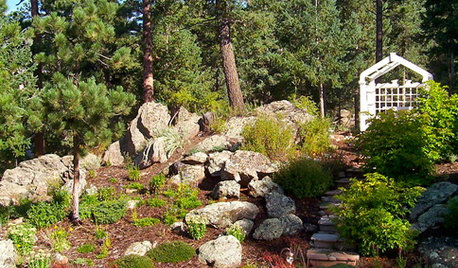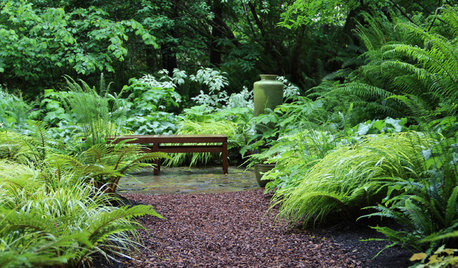Moist soil around the house
Steve
9 years ago
Related Stories

FLOWERS AND PLANTSAruncus Dioicus Is a Stately Plant for Shady, Moist Garden Spots
Plant goat’s beard in perennial and woodland gardens. Its large white spring blooms attract bees, beetles and butterflies
Full Story
GARDENING GUIDESHow to Pick a Mulch — and Why Your Soil Wants It
There's more to topdressing than shredded wood. Learn about mulch types, costs and design considerations here
Full Story
GARDENING GUIDESHow to Stop Worrying and Start Loving Clay Soil
Clay has many more benefits than you might imagine
Full Story
GARDENING GUIDESGardening Solutions for Heavy Clay Soils
What’s a gardener to do with soil that’s easily compacted and has poor drainage? Find out here
Full Story
GARDENING GUIDESGet the Dirt on Your Garden’s Soil
Understand how your soil supports your plants so you can ensure your garden’s success
Full Story
GARDENING GUIDESHave Acidic Soil in Your Yard? Learn to Love Gardening Anyway
Look to acid-loving plants, like conifers and rhododendrons, to help your low-pH garden thrive
Full Story
GARDENING GUIDESInvite Cellophane Bees to Your Garden by Providing Patches of Bare Soil
Look for cellophane bees (Colletes) pollinating flowering trees and shrubs in U.S. gardens this spring
Full Story
GARDENING GUIDESHouzz TV: Make a Worm Bin for Rich Soil and Happy Plants
A worm-powered compost bin that can fit under a sink turns food scraps into a powerful amendment for your garden. Here’s how to make one
Full Story
GARDENING GUIDESGreat Design Plant: Try Blue Bells for Blooms in Dry Soil
This shrub’s violet-blue flowers and silvery foliage brighten low-water gardens all year long
Full Story
GARDENING GUIDES10 Solutions for Soggy Soil
If a too-wet garden is raining on your parade, try these water-loving plants and other ideas for handling all of that H2O
Full Story






Okiedawn OK Zone 7
AmyinOwasso/zone 6b
Related Professionals
Barrington Hills Landscape Architects & Landscape Designers · Bergenfield Landscape Contractors · Deerfield Landscape Contractors · Fairfield Landscape Contractors · Hoover Landscape Contractors · Morrisville Landscape Contractors · Old Saybrook Landscape Contractors · Roseville Landscape Contractors · Weslaco Landscape Contractors · Tyngsboro Landscape Contractors · Raytown Landscape Contractors · Suisun City Landscape Contractors · Kernersville Decks, Patios & Outdoor Enclosures · Rocklin Decks, Patios & Outdoor Enclosures · Eustis Decks, Patios & Outdoor EnclosuresSteveOriginal Author
Okiedawn OK Zone 7
SteveOriginal Author
SteveOriginal Author
Okiedawn OK Zone 7
SteveOriginal Author
Lisa_H OK
chickencoupe
slowpoke_gardener